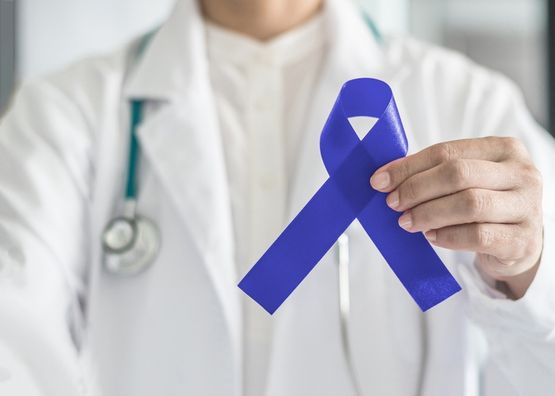Colorectal cancer is common, affecting approximately 1 in every 23 men and 1 in 25 women in the US in their lifetime. Staying up-to-date on recommended cancer screenings has proven to be a highly effective way to detect cancer earlier, start treatment sooner and slow disease progression. Cancer screenings, like colonoscopies, are particularly effective for colorectal cancer because it progresses slowly.
Our board-certified Gastroenterologists, Drs. Kashyap Katwala, MD and Rafi Ali, MD and Ciarán Bradley, MD, FACS, board certified in surgery and surgical oncology answer your common questions about colorectal cancer, the risk factors you should be aware of and what treatment options are available.
Colorectal Cancer Screening & Symptoms Q & A with Gastroenterologists Kashyap Katwala, MD and Rafi Ali, MD
What are the most common risk factors associated with colorectal cancer?
Risk factors commonly linked to colorectal cancer include:
- Age: Colorectal cancer is most common in individuals over the age of 45, however, over the last several years the number of colorectal cancer cases being diagnosed in patients under the age of 35 has been on the rise
- Hereditary factors and genetics: A family history of colorectal cancer or a personal history of polyps or other types of cancers increases your risk
- Having other gastrointestinal conditions: Certain conditions including Crohn’s disease, colon polyp syndrome, inflammatory bowel disease (IBD) or ulcerative colitis can increase your risk
- Smoking: If you are a current smoker or have smoked in the past, you are at risk of developing several types of cancers including colorectal cancer
When should you start screening for colorectal cancer?
All individuals 45 years of age or older should be screened for colorectal cancer. Individuals considered to be at higher risk may be advised by their primary care physician to start screening sooner or more frequently. It is never too early to start talking with your physician about your risk for colorectal cancer and establishing a screening schedule appropriate for you.
Schedule your screening colonoscopy today >
How can I reduce my risk of developing colorectal cancer?
A diet that is high in fiber and low in fats can lower your risk of colorectal cancer. Your physician may also recommend you take certain supplements like calcium or low-dose aspirin. If you currently smoke, taking steps to quit will lower your risk for several cancers, including colorectal cancer.
How is colorectal cancer diagnosed?
A colonoscopy is the most accurate way to detect colorectal cancer earlier when it is most treatable. Colonoscopies help detect polyps and a sampling of tissue (biopsy) can be obtained to confirm the diagnosis.
What are the symptoms of colorectal cancer?
Colorectal cancer often doesn’t produce noticeable symptoms until the cancer has reached a more advanced stage and can include:
- Abdominal Pain
- Changes in bowel habits
- Fatigue
- Rectal bleeding or blood in your stool
- Unintentional weight loss
What are the survival rates for colorectal cancer?
The five-year survival rate for colorectal cancer varies significantly based on the staging of the cancer at the time it is diagnosed. The earlier the cancer is detected and treatment is started, the better the outcome, which is why cancer screenings are so important.
- Colorectal cancer discovered at an early stage, when the cancer has not spread outside the colon, has about a 90% five-year survival rate
- Colorectal cancer found at a regional stage, when the cancer has spread to surrounding tissues, has approximately a 74% five-year survival rate
- Colon cancer identified in an advanced stage, when the cancer has spread to other organs, has a five-year survival rate of about 17%
Colorectal Cancer Treatment Q & A with Surgeon Ciaran Bradley, MD, FACS
What are the treatment options for colorectal cancer?
Each colorectal cancer treatment plan varies by patient and takes into consideration a variety of factors including your overall health, the cancer stage and location. The most common treatments for colorectal cancer include chemotherapy medications which prevent cancerous cells from spreading, radiation therapy to shrink or destroy tumors and surgery to remove the cancerous growth. In some cases, you may receive a combination of these treatments. Your cancer treatments are a collaborative effort by an entire care team that includes a medical oncologist, a surgeon who specializes in oncology-related procedures, a radiation oncologist and other support staff.
If radiation therapy or chemotherapy is needed — is it better to have before or after surgery — and why?
There are pros and cons to receiving chemotherapy and/or radiation therapy before or after surgery for colon or rectal cancer, depending on the location of the cancerous tumor. If you have been diagnosed with colon cancer and surgery is an option, we often recommend the surgery be performed prior to other treatments, so that we can use the post-surgical pathology information obtained to help guide all other treatment decisions. In some cases, surgery may be the only treatment needed.
For rectal cancer, treatment timing depends on the degree to which the cancer has grown and spread within the rectum and nearby lymph nodes (which can be better tested for in rectal rather than colon cancer). For superficial tumors or tumors that have not spread to lymph nodes, surgery is the best first option. For deeper tumors, or those that show involved lymph nodes, we usually recommend a combination of chemotherapy and radiation therapy prior to surgery, followed by additional chemotherapy.
Is minimally invasive surgery ever an option for colorectal cancer?
Minimally invasive surgery options are available and include laparoscopic or robot-assisted surgery. Benefits of minimally invasive or robot-assisted surgery often include a smaller incision and reduced recovery times.
If you have had other surgeries in the past that have created significant scar tissue in your abdominal area or have other health conditions that might make the procedure too dangerous compared to traditional open surgery, you may not be a candidate for minimally invasive surgery. Your surgeon will work with you to select the surgical option that is best for you.
To best protect yourself against colorectal cancer, you should complete a colonoscopy at the age of 45. Talk to your doctor now to determine your risk for developing colorectal cancer, and if you are determined to be at higher-than-average risk, your physician may recommend you begin screening before the age of 45 or be screened more frequently.
If you are at an average risk, scheduling a screening colonoscopy can be done without an in-person consult. Our nurses are available to conduct an over-the-phone assessment and provide you with the information and prep instructions you will need to complete your colonoscopy. Call 630−717−2600 to schedule schedule your screening colonoscopy today.
Health Topics:










